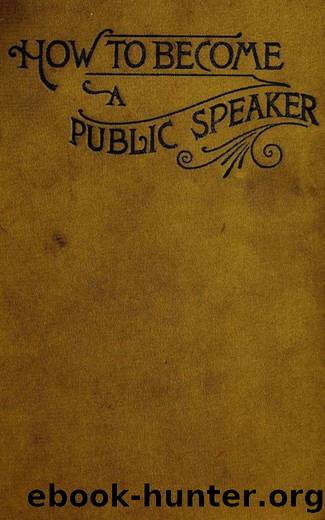How to Become a Public Speaker - Showing the best manner of arranging thought so as to gain conciseness, ease and fluency in speech by William Pittenger

Author:William Pittenger [Pittenger, William]
Language: eng
Format: epub
Publisher: anboco
Published: 2017-01-01T23:00:00+00:00
CHAPTER XI.
The Pen and the Tongue.
It does not follow from anything we have said that the pen should be discarded by the extempore speaker. Because he is not obliged to write each word, he should not feel excused from writing altogether. Few greater misfortunes could happen to a speaker than being deprived of the power of recording and preserving notes for the purposes of oratory. The most tenacious memory is burdened by the weight of a large number of intended discourses, especially if they are long and complex. No person can feel sure that he will remember all parts of the speech he intended to utter even in outline, unless it has been reduced to regular form so that one part will suggest another. In going to a store to purchase a few articles the pen is very useful in making a memorandum; if the errand boy neglects that precaution some of the most essential things may be forgotten. Among illiterate people a great many mnemonic signs have been employed, such as associating things to be remembered with the fingers, etc.; but among intelligent persons all of these have been superseded by the use of writing, and it would be very absurd to advocate a return to the old modes on the plea that the memory might be so strengthened that all items could be safely remembered. The reply would be ready: “Yes, it is possible; but we have a far better and less burdensome way of accomplishing the same object and have no motive in returning to the more difficult mode.” Thus while it may be possible to arrange in the mind all the outlines of a long discourse, it is not easy to do it, and there is no gain in the extra labor involved. Everything bearing upon a discourse may be written in brief outline, and then a selection made of what is best, throwing out all other portions. The remainder can then be far better arranged when in such a position that the eye as well as the mind can glance at it. The preparation for the intended speech thus assumes the shape of a miniature or outline, and may be filled out at any point which needs strengthening.
But even if it were possible to construct the plan and speak well without any previous use of the pen, this would, in the majority of cases, be insufficient. The orator needs to preserve the materials, if not the form of his oration, either for use in future speeches or for comparison with later efforts. It is very wasteful to throw away valuable material once accumulated, and then search the same ground over again when required to treat the same topic. This would be acting in the spirit of the savage who eats enough to satisfy his appetite and throws away all that remains, as he feels no further need for it, and only begins to gather again when hunger spurs him to exertion.
The pen is the instrument of accumulation and preservation, and should be diligently employed.
Download
This site does not store any files on its server. We only index and link to content provided by other sites. Please contact the content providers to delete copyright contents if any and email us, we'll remove relevant links or contents immediately.
Evelina by Fanny Burney(26866)
Evelina, Or, the History of a Young Lady's Entrance into the World by Fanny Burney(26279)
Twilight of the Idols With the Antichrist and Ecce Homo by Friedrich Nietzsche(18624)
Pale Blue Dot by Carl Sagan(4996)
The Perks of Being a Wallflower by Stephen Chbosky(4639)
Dune 01 Dune by Frank Herbert(4395)
Double Down (Diary of a Wimpy Kid Book 11) by Jeff Kinney(4261)
Man and His Symbols by Carl Gustav Jung(4131)
Walking by Henry David Thoreau(3953)
Separate Beds by LaVyrle Spencer(3823)
Ficciones by Jorge Luis Borges(3625)
FOUNDATION AND EMPIRE by Isaac Asimov(3584)
The 101 Dalmatians by Dodie Smith(3506)
Mystery at School by Laura Lee Hope(3476)
Anna and the French Kiss by Stephanie Perkins(3357)
120 Days of Sodom by Marquis de Sade(3262)
Some Prefer Nettles by Tanizaki Junichiro(2886)
The Little Prince by Antoine de Saint-Exupéry(2874)
My Ántonia by Willa Cather(2845)
